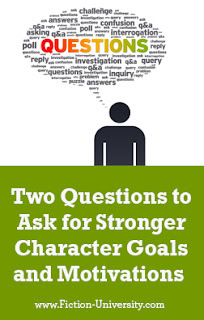Janice Hardy's Blog, page 2
August 9, 2025
The Difference Between a Task and a Goal When Plotting
 By Janice Hardy
By Janice HardyDoes your protagonist really need to do that?
Many writers struggle with plotting because they add “stuff”to a scene without thinking about how that stuff affects the story. They think“All scenes need a goal, so let’s add a goal,” but what they write is a scenewhere someone cleans a room, delivers a package, or walks across the village tograb an ale. It feels like progress since the protagonist is active and moving,but they’re not pursuing a goal. They’re only completing a task.
And tasks aren’t compelling. They’re filler disguised as plot.
Tasks might fill pages, but they don’t fuel the story,because there’s nothing to be gained or lost by completing them. A room getsclean, a package arrives, and an ale is enjoyed, but they have zero effect onhow the story turns out.
What the plot needs, are goals.
Continue ReadingWritten by Janice Hardy. Fiction-University.comAugust 6, 2025
Why Your Amazon Book Page Isn’t Converting — and How to Fix It
 By Penny Sansevieri
By Penny SansevieriPart of the Indie Author Series
JH: If you’ve been running ads, posting on social media, and doing all the “right” things but sales are still stuck in slow gear, the problem might not be your book—it might be your book page. The amazing Penny Sansevieri is here today, sharing exactly how to identify what’s holding your page back and how to fix it.
Take it away, Penny…
You’ve written a great book. Maybe you’ve even run someAmazon ads, tried social media, or landed a few book reviews. But your sales?They’re trickling in—or worse, stalled completely.
Sound familiar?
If so, you’re not alone. One of the most common challengesauthors face isn’t visibility. It’s conversion. In other words,people are finding your book—but they’re not buying it.
Continue ReadingWritten by Janice Hardy. Fiction-University.comAugust 2, 2025
5 Ways to Create Nuance in Your Characters
 By Janice Hardy
By Janice HardyIt’s not the big,flashy moments that make characters unforgettable—it’s the subtle differencesand distinctions.
One of my favorite writing quotes is: “Readers come for theplot, but they stay for the characters.” It’s a good reminder that stories areultimately about people and their problems, and no matter how interesting thatproblem might be, flat, dull characters won’t keep the reader engaged. I’veflipped to the end of a few “great plot, bad characters” books because I wantedto know the ending, but I didn’t want to slog through the story to get there.
What could have saved those books from such a horrible fatewas stronger characters. What could have made those books unforgettable was nuanced characters.
Continue ReadingWritten by Janice Hardy. Fiction-University.comJuly 26, 2025
How to Describe Your Setting Without Infodumping
 By Janice Hardy
By Janice HardyBring your world tolife without burying readers in the details.
Crafting a setting is about more than telling readers whereyour story takes place—it’s about inviting them to step inside your story worldand making them feel like they belong. When your setting feels real, yourcharacters also feel real, and readers are more likely to care about whathappens to them. A well-drawn world can ground your narrative and create animmediate emotional connection.
It’s tempting to describe every brick, breeze, and blade ofgrass in a setting you love, but too much description all at once can drownyour story (and reader) in information. Instead of pulling readers in, you riskmaking them feel like they’re slogging through a travel brochure.
The strongest settings come alive organically. They’re woveninto the action, filtered through the character’s perspective, and delivered ineasy-to-digest spoonfuls that keep the story moving while showing readers all they need to know about the world.
Continue ReadingWritten by Janice Hardy. Fiction-University.comJuly 19, 2025
3 Ways to Add Tension to a Scene
 By Janice Hardy
By Janice HardyIf your scene lacks excitement, try making someone squirm.
I wrote an interrogation scene for my detective WIP that should have been dripping with tension, but it read like a giant infodump. No resistance. No stakes. Just the bland back-and-forth of information I wanted readers to know, and the whole scene just went splat.
This is pretty common, especially in early drafts. We know what happens in our story and why, so we tend to skip over the uncertainty that creates that all-important story tension.
But without that uncertainty, scenes can feel like they're just going through the motions.Continue ReadingWritten by Janice Hardy. Fiction-University.com
July 12, 2025
What Your Favorite Book Can Teach You About Writing
 By Janice Hardy
By Janice HardyYour favorite book ismore than a great read—it’s a masterclass in writing craft.
I have a beat-up copy of Dave Duncan’s The Gilded Chain on my shelf that’s filled with notes in themargins and highlighted passages in different colors. It was my writingtextbook when I was figuring out how to write and analyzing what made the booksI loved work.
I loved Duncan’s prose. (Still do.) It’s smooth, clear,never draws attention to itself, but always pulls me right into the story. Istudied how he structured sentences, how he handled action, how he manageddialogue without slowing the pace. I wasn’t trying to mimic him—I was trying tounderstand why his writing kept meturning pages long past midnight.
Continue ReadingWritten by Janice Hardy. Fiction-University.comJune 21, 2025
The Secret to Avoiding the Sagging Story: What Makes a Good Middle
 By Janice Hardy
By Janice HardyMany writers dread the middle of a novel—but writing a strong one is easier than you think.
When I was new to writing, every novel I wrote bogged down in the middle. I’d start off well, but then run out of things for my protagonist to do, so I’d start making things up just to fill up space. Soon, it would turn into a complete mess and I’d start over.
I can’t tell you how many times I did this. Dozens at least, if not more.
Eventually, the frustration got to me and I decided if I wanted to break this cycle of despair, I’d have to find a way to get through the middle of my novel.
And I did.
So well, in fact, that my agent said my first novel’s middle was “damn near perfect.”
Continue ReadingWritten by Janice Hardy. Fiction-University.com
June 14, 2025
Two Questions to Ask for Stronger Character Goals and Motivations
 By Janice Hardy
By Janice HardyStrong plots start with two deceptively simple questions.
The sheer number of plotting questions I get—both in personand online—is a good indication that plotting is something a lot ofwriters wrestle with. And it’s not always because they don’t understand storystructure or scene dynamics.
You can write gorgeous prose and still wind up with a storythat meanders, stalls, or lacks punch. That’s because the characters aren’tmaking active, motivated choices that drive the story. They’re just… doingthings.
“Because that’s what has to happen next” isn’t agoal.I’ve had countless brainstorming sessions with stuck writers(and been one myself), and over the years, I’ve noticed something. No matterhow complex the plot, how high the stakes, or how elaborate the worldbuilding,the problem almost always comes down to one missing element: goals.
Continue ReadingWritten by Janice Hardy. Fiction-University.comJune 7, 2025
Where Was I Going Again? The Benefits of Re-Reading During a Revision
 By Janice Hardy
By Janice HardyA re-read might be theright path to find your story and fall in love with it all over again.
Many writers shudder at the very thought of revising theirnovel. Others curse. But I’ve always enjoyed the revision process (don’t hateme). I’ve found it’s where my best writing happens, because I know how my storyturned out and I have a much better understanding of who the characters are andwhat they want and need to do.
Even if you’re a meticulous outliner, your final draftrarely matches your original plan exactly. And if you’re a pantser or discoverywriter? Well, your manuscript may resemble your initial vision about as much asa squirrel resembles a spaceship. Though honestly, that can happen to plotters,too.
Because things change as we write. Motivations shift. Newideas pop up halfway through and suddenly alter our understanding of the plot.Characters do things we didn’t plan, and sometimes what sounded brilliant inChapter Eight feels like a complete mistake by Chapter Twenty.
Continue ReadingWritten by Janice Hardy. Fiction-University.comMay 31, 2025
The Great Word Count Freakout (And Why You Can Relax)
 By Janice Hardy
By Janice HardyFigure out your word count without losing your mind.
You’ve finally finished the novel you’ve been working on foroh-so-long. You poured your heart into it, metaphorically bed on the pages, andfinally typed “The End” before doing a little happy dance. Then you checkedyour word count—and panic set in.
Is it too long? Too short? Will agents laugh? Will readersriot? Should you cut 30,000 words? Add 20,000? Toss the whole thing into a fireand start over?
Take a deep breath. It’s all going to be okay.
Stressing out over your word count happens to pretty muchevery at some point.Continue ReadingWritten by Janice Hardy. Fiction-University.com


